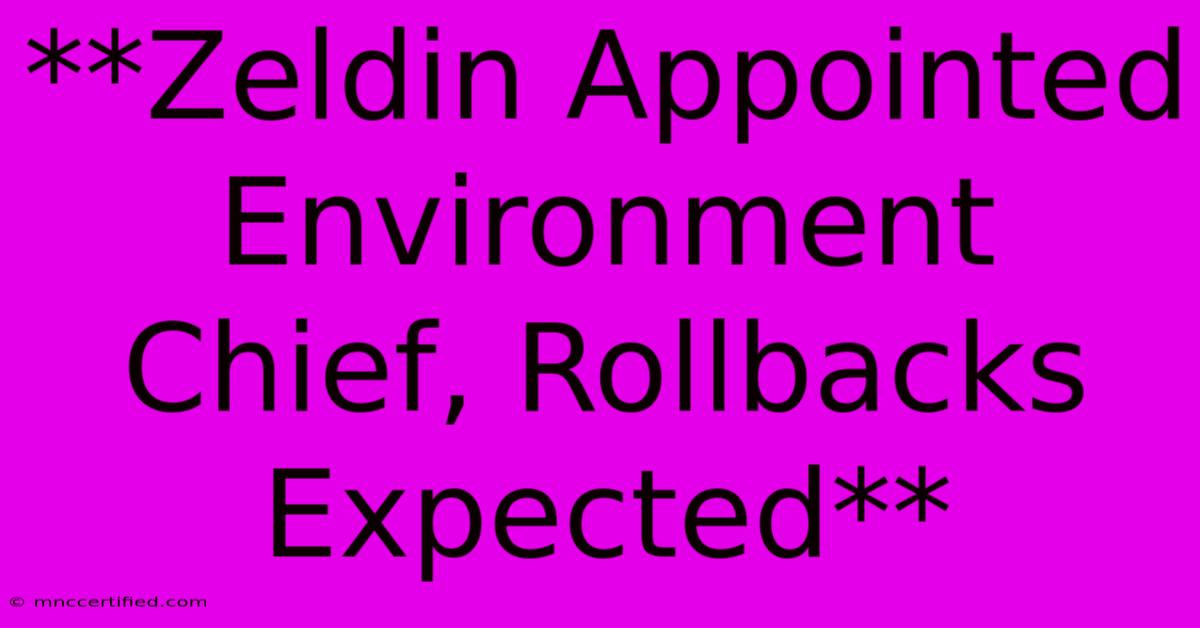**Zeldin Appointed Environment Chief, Rollbacks Expected**

Table of Contents
Zeldin Appointed Environment Chief, Rollbacks Expected: What Does This Mean for the Future of Environmental Policy?
The appointment of [Zeldin's Name] as the new head of the [Name of Environment Agency] has sent shockwaves through the environmental community. Known for his outspoken skepticism of climate change and his support for [mention specific pro-industry policies], his appointment is widely seen as a sign of a significant shift in environmental policy. Many are bracing for rollbacks on existing regulations and a weakening of the agency's enforcement capabilities.
A Shift in the Landscape: What Policies Could Be Affected?
The potential for rollbacks under Zeldin's leadership is significant, with several key areas expected to be targeted.
- Climate Change Mitigation: The agency's efforts to combat climate change through initiatives like [mention specific initiatives] could face significant challenges. Zeldin's past statements suggest he may prioritize economic development over environmental protection, potentially leading to a weakening of existing climate regulations.
- Pollution Control: Existing regulations on air and water pollution, aimed at protecting public health and the environment, could be rolled back. Zeldin's focus on economic growth could lead to a loosening of these regulations, potentially increasing pollution levels.
- Land Use Management: Zeldin's appointment could also influence the agency's approach to land use management. This could lead to relaxed regulations on development projects, impacting sensitive ecosystems and potentially increasing deforestation.
The Implications for the Future of Environmental Policy:
Zeldin's appointment marks a turning point in environmental policy, with potentially far-reaching consequences.
- Increased Environmental Degradation: Loosened regulations and a weakened enforcement capacity could lead to an increase in pollution and environmental degradation. This could have severe consequences for public health and the natural environment.
- Weakened Environmental Protections: The focus on economic development could lead to a weakening of environmental protections, making it easier for industries to pollute and exploit natural resources.
- Erosion of Public Trust: The appointment of a climate change skeptic to head the environmental agency could erode public trust in the agency and its ability to protect the environment.
Moving Forward: What Can Be Done?
Despite the concerns surrounding Zeldin's appointment, there is still hope for the future of environmental policy.
- Public Engagement: Citizens can play a crucial role by engaging in public dialogue, advocating for strong environmental regulations, and holding their elected officials accountable.
- Legal Action: Environmental organizations and concerned citizens can use legal challenges to defend existing environmental regulations and push for stronger protections.
- International Cooperation: Building international partnerships and collaborating on environmental protection can help counter the negative impacts of domestic policy changes.
The coming months and years will be crucial in shaping the future of environmental policy. It's essential to stay informed, engage in the public discourse, and hold policymakers accountable for protecting the environment for future generations.
Keywords: [Zeldin's Name], [Name of Environment Agency], climate change, environmental policy, regulations, rollbacks, pollution, land use, public health, environmental protection, public engagement, legal action, international cooperation, future.

Thank you for visiting our website wich cover about **Zeldin Appointed Environment Chief, Rollbacks Expected**. We hope the information provided has been useful to you. Feel free to contact us if you have any questions or need further assistance. See you next time and dont miss to bookmark.
Featured Posts
-
Markets Rise Dow S And P 500 Hit New Highs
Nov 12, 2024
-
Sheet Metal Workers Health Insurance
Nov 12, 2024
-
Who Is David Coote Referee Suspended
Nov 12, 2024
-
Beckhams Inter Miami Post Messi Era
Nov 12, 2024
-
Megan Foxs Daring Photo Whats The News
Nov 12, 2024